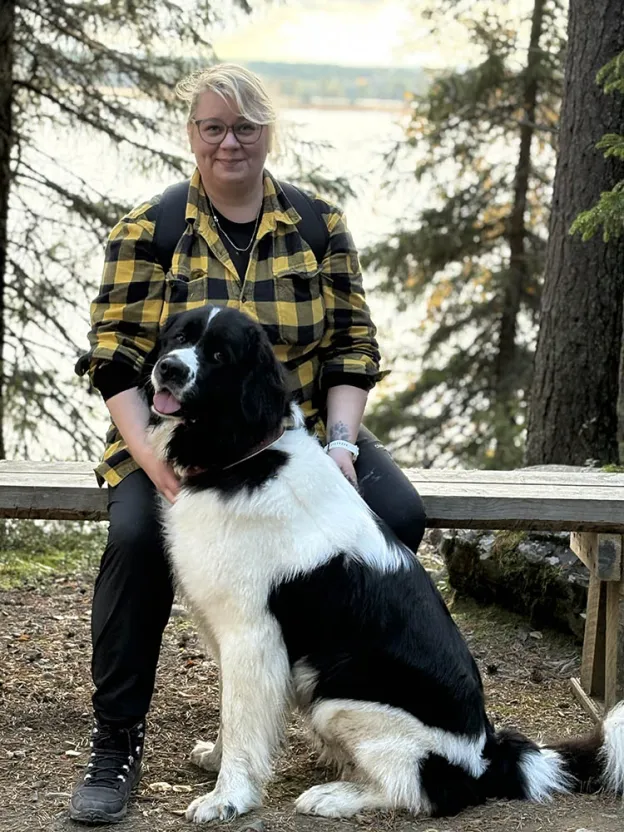When everything is spinning and your feet aren't with you, the workday ends right there. Riikka Miettinen knows this all too well. Ménière's disease, a rare inner ear disorder, can make life unpredictable.
- The world is spinning, I can't stand up, and I don't know when it will end. At my worst, I'd crawl to the toilet to vomit, if I can crawl at all now, she says, describing the most violent moments of the disease.
The symptoms also include hearing loss and constant tinnitus, or ringing in the ears.
The first signs of the disease were ear congestion and hearing loss. Vertigo soon followed. At first, Miettinen thought it was an ear infection, but when the attacks started, it was clear that it was no longer a minor ailment.
Through tests and MRI scans, a diagnosis was quickly made.
- It was then that I got a name for what had changed my daily life. On the one hand it was a relief to know the cause, but at the same time it was scary because this is a lifelong condition, says Miettinen.

Adaptations allow me to work
Miettinen works as a scheduler at Charles River Laboratories, a pharmaceutical and biotechnology research company in Kuopio.
She schedules tasks and shifts for people to help them through research and projects. Much of the work is done on a computer and involves planning with team leaders and researchers.
Disease-induced episodes don't wait for a convenient time or place. If nausea strikes in the middle of the day, it's important to be able to stop work there.
- My line managers have been really understanding about this - they've picked up on the disease and I get space and flexibility accordingly.
What has been crucial to maintaining my ability to work has been the accommodations made by my employer, most importantly the fact that I can do a lot of telecommuting..
- When I have an episode, it's easier not having to worry about how I'm going to get home from work vomiting. You can stop work and pick up where you left off the next day.
The hustle and bustle of an open-plan office can can also be overwhelming: loud, shrill, sudden noises hurt your ears. That's why Miettinen can use individual quiet rooms in the workplace.
- Without this flexibility, I would probably be on sick leave all the time.
Openness helps you cope with illness
Ménière's disease is hereditary and there is no single treatment that works. In Miettinen's case, the drugs didn't work, and only a series of cortisone injections through the eardrum helped.
- It wasn't painless, but it was a relief compared to the discomfort.
The disease limits everyday life. A bout of nausea sometimes gives signs of itself, but it can also come out of the blue.
- Even if I'm feeling good right now and feel like going to the shops or meeting a friend, things can change in a minute and then I'm throwing up in the toilet. Things get cancelled and left undone.
But everyday life can and must be lived, and an important part of that is work. In the medical work community, there has been plenty of understanding with illness.
- I've been lucky to have an understanding employer and colleagues who have been understanding and helpful. I wish everyone had the same support, says Miettinen.
Illness is not the easiest thing to raise in the workplace, but openness helps.
- You have to talk and ask for help. I've been in deep water, and without support I'd still be there.
The employer has an obligation to make reasonable accommodations for a disabled employee
- The Non-Discrimination Act obliges employers to make reasonable adjustments to ensure that people with disabilities can cope at work and advance in their careers. The assessment of reasonableness takes into account, among other things, the size of the employer, the financial situation and the cost of the accommodation.
- Such adjustments may relate to the working environment, working time arrangements, aids, guidance or training, among other things. In general, adjustments benefit the whole work community.
- The employer has a duty to determine whether reasonable adjustments are also needed at the recruitment and termination stages. If the need arises, the employer must implement them.
- Delay or failure to make adjustments may give rise to a presumption of discrimination.
- There is no unambiguous legal definition of disability in Finland and the boundaries of disability and illness are not clear. For example, the EU Court of Justice has broadened rather than narrowed the concept. The UN defines disability as a long-term physical, mental, intellectual or sensory impairment which, together with environmental barriers, limits participation in society on an equal basis with others.
Disability does not automatically imply barriers to work, but accommodations are made to put a person on an equal footing with others. Nor does disability imply automatic incapacity or partial disability.
Text by Taru Reinikainen,National Collective Agreement Specialist, Trade Union Pro

